Saturday, November 05, 2011
Guy Fawkes' Night
This is a dark anniversary for English and Irish Catholics. On this day, Guy Fawkes, in response to the bitter persecution of Catholics under the English monarchy, tried to blow up the King, the Lords spiritual and temporal, and the House of Commons, on the occasion of the King's speech before the joint Houses of Parliament. If he had succeeded, Catholics in Britain would have fared even worse.
But his failure made this day one of the secular holidays of protestant Britain, and a vile, anti-Catholic one it is. Bonfires are still held, with dummies of Guy Fawkes burned in them. In Colonial Boston, this holiday took the form of Pope's Night. I could describe it at length, but I prefer to turn you over to this brand new page exploring Guy Fawkes Night/Pope's Night, which I found out about via the Boston 1775 blog (which I don't write, but wish I had the idea!).
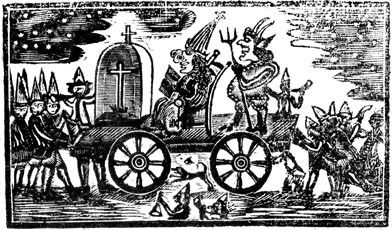
But his failure made this day one of the secular holidays of protestant Britain, and a vile, anti-Catholic one it is. Bonfires are still held, with dummies of Guy Fawkes burned in them. In Colonial Boston, this holiday took the form of Pope's Night. I could describe it at length, but I prefer to turn you over to this brand new page exploring Guy Fawkes Night/Pope's Night, which I found out about via the Boston 1775 blog (which I don't write, but wish I had the idea!).

Labels: Annual Cycles
Our Blessed Lady's Saturday

Mother of Mercy, thine influence is so great that thy divine Son will refuse thee nothing. Implore Him, please, to release from the pains of Purgatory our parents, friends, and benefactors, that they may join the heavenly choirs in praising Him and in interceding for us.
Amen,
Labels: Our Blessed Lady
Friday, November 04, 2011
Saint Charles Borromeo
Friday At the Foot Of the Cross

O Lord Jesus Christ, King of Glory, deliver the souls of all the faithful departed from the pains of hell and from the bottomless pit. Deliver them out of the lion's mouth, lest hell should swallow them up, lest they fall into the outer darkness. Let Thy standard-bearer, Saint Michael, bring them back into Thy holy light, which Thou didst promise of old to Abraham and to his posterity.
Amen.
Labels: Friday At the Foot Of the Cross
Wednesday, November 02, 2011
Mid-Week Mix, All Souls' Day Edition
The Young Tradition, The Lyke Wake Dirge
Sting, Soul Cakes
From Naxos' Ego sum Resurrectio CD, Dies Irae
Cherish the Ladies, The Ballad Of the Fox Hunter
Monks of Cistercian Abbey of Stift Heiligenkreuz, REQUIEM AETERNAM
Loreena McKennitt, All Souls' Night
Carlos Puma, Dia de Los Muertos
The Clancy Brothers and Tommy Makem, Isn't It Grand, Boys?
Sting, Soul Cakes
From Naxos' Ego sum Resurrectio CD, Dies Irae
Cherish the Ladies, The Ballad Of the Fox Hunter
Monks of Cistercian Abbey of Stift Heiligenkreuz, REQUIEM AETERNAM
Loreena McKennitt, All Souls' Night
Carlos Puma, Dia de Los Muertos
The Clancy Brothers and Tommy Makem, Isn't It Grand, Boys?
Labels: Pleasing Tunes
All Souls' Day, 2011
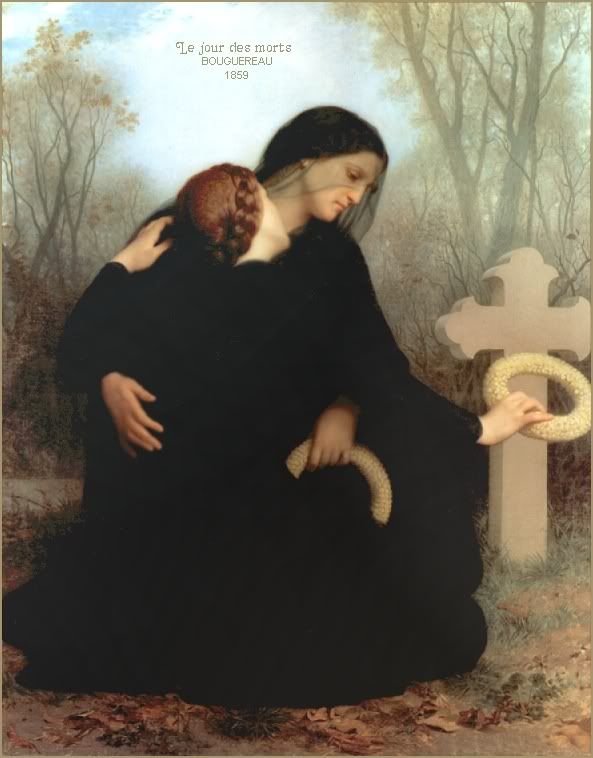
All Saints' Day, by Bouguereau
V. Requiem aeternam dona eis, Domine.
R. Et lux perpetua luceat in eis.
V. Requiescant in pace.
R. Amen.
Kathryn & George
Thomas
Nora & Thomas
Felicia & Louis
Patrick & Susan
Bridget & Michael
Herbert
Barbara
Austin
Mary & Charles
Ida & Edward
Rudolph
Emily & Anthony
Mary and John
Tom
Joe
Elmer
Grace & William
Winifred & Louis
Rose & Harold
Mildred & Frank
Minerva & Joseph
Bea & Roland
Vincent
William
Samson
Patricia
Mary & James
Brother Daniel
Thomas
Joseph
June
Gene
Glenn
Henrietta
Nick
Kevin
Father Flaherty
Mary & John
Brother Chad, CFX
Father Mahoney, SJ
Father Cheney, SJ
Father Fitzptarick
Doctor Miller
Doctor Daly
Frank
Tommy
Memorial Prayer for the Suffering Souls in Purgatory
(For Private Use Only)
Almighty God, Father of Goodness and love,
have mercy on the Poor Suffering Souls,
and grant Thine aid:
To my dear parents and ancestors;
Jesus, Mary, Joseph! My Jesus Mercy.
To my brothers and sisters and other near relatives;
Jesus, Mary, Joseph! My Jesus Mercy.
To my benefactors, spiritual and temporal; etc.
To my former friends and subjects;
To all for whom love or duty bids me pray;
To those who have suffered disadvantage or harm through me;
To those who have offended me;
To all those who are especially beloved by Thee;
To those whose release is at hand;
To those who desire most to be united with Thee;
To those who endure the greatest suffering;
To those whose release is most remote;
To those who are least remembered;
To those who are most deserving on account of their services to the Church;
To the rich, who now are the most destitute;
To the mighty, who now are as lowly servants;
To the blind, who now see their folly;
To the frivolous, who spent their time in idleness;
To the poor, who did not seek the treasures of Heaven;
To the tepid, who devoted little time to prayer;
To the indolent, who were negligent in performing good works;
To those of little faith, who neglected the frequent reception of the Sacraments;
To the habitual sinners, who owe their salvation to a miracle of grace;
To parents who failed to watch over their children;
To superiors who were not solicitous for the salvation of those entrusted to them;
To the souls of those who strove for hardly anything but riches and pleasures;
To the worldly-minded, who failed to use their wealth and talents in the service of God;
To those who witnessed the death of others, but would not think of their own;
To those who did not provide for the great journey beyond, and the days of tribulation;
To those whose judgment is so severe because of the great things entrusted to them;
To the popes, rulers, kings and princes;
To the bishops and their counselors;
To my teachers and spiritual advisors;
To the deceased priests of this diocese;
To all the priests and religious of the whole Catholic Church;
To the defenders of the Holy Faith;
To those who died on the battlefield;
To those who are buried in the sea;
To those who died of stroke or heart attack;
To those who died without the last rites of the Church;
To those who shall die within the next twenty-four hours;
To my own poor soul when I shall have to appear before Thy judgment seat;
V. O Lord, grant eternal rest to all the souls of the faithful departed,
R. And let perpetual light shine upon them.
V. May they rest in peace.
R. Amen.
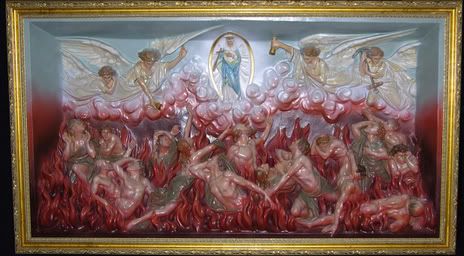
Dies Irae
The day of wrath, that day
which will reduce the world to ashes,
as foretold by David and the Sybil.
What terror there will be,
when the Lord will come
to judge all rigorously!
The trumpet, scattering a wondrous sound
among the graves of all the lands,
will assemble all before the Throne.
Death and Nature will be astounded
when they see a creature rise again
to answer to the Judge.
The book will be brought forth
in which all deeds are noted,
for which humanity will answer.
When the judge will be seated,
all that is hidden will appear,
and nothing will go unpunished.
Alas, what will I then say?
To what advocate shall I appeal,
when even the just tremble?
O king of redoutable majesty,
who freely saves the elect,
save me, o fount of piety!
Remember, merciful Jesus,
that I am the cause of your journey,
do not lose me on that day.
You wearied yourself in finding me.
You have redeemed me through the cross.
Let not such great efforts be in vain.
O judge of vengeance, justly
make a gift of your forgiveness
before the day of reckoning.
I lament like a guilty one.
My faults cause me to blush,
I beg you, spare me.
You who have absolved Mary,
and have heard the thief's prayer,
have also given me hope.
My prayers are not worthy,
but you, o Good One, please grant freely
that I do not burn in the eternal fire.
Give me a place among the sheep,
separate me from the goats
by placing me at your right.
Having destroyed the accursed,
condemned them to the fierce flames,
Count me among the blessed.
I prostrate myself, supplicating,
my heart in ashes, repentant;
take good care of my last moment!
That tearful day,
when from the ashes shall rise again.
Sinful man to be judged.
Therefore pardon him, o God.
Merciful Lord Jesus,
give them rest.
Amen.
Dies irae, dies illa
solvet saeclum in favilla,
teste David cum Sybilla.
Quantus tremor est futurus,
quando judex est venturus,
cuncta stricte discussurus.
Tuba mirum spargens sonum
per sepulchra regionum,
coget omnes ante thronum.
Mors stupebit et natura,
cum resurget creatura,
judicanti responsura.
Liber scriptus proferetur,
in quo totum continetur,
unde mundus judicetur.
Judex ergo cum sedebit,
quidquid latet apparebit,
nil inultum remanebit.
Quid sum miser tunc dicturus?
Quem patronum rogaturus,
cum vix justus sit securus?
Rex tremendae majestatis,
qui salvandos salvas gratis,
salva me, fons pietatis.
Recordare Jesu pie,
quod sum causa tuae viae,
ne me perdas illa die.
Quaerens me sedisti lassus,
redemisti crucem passus,
tantus labor non sit cassus.
Juste judex ultionis,
donum fac remissionis
ante diem rationis.
Ingemisco tanquam reus,
culpa rubet vultus meus,
supplicanti parce, Deus.
Qui Mariam absolvisti,
et latronem exaudisti,
mihi quoque spem dedisti.
Preces meae non sunt dignae,
sed tu, bonus, fac benigne,
ne perenni cremer igne.
Inter oves locum praeta,
et ab hoedis me sequestra,
statuens in parte dextra.
Confutatis maledictis,
flammis acribus addictis,
voca me cum benedictis.
Oro supplex et acclinis,
cor contritum quasi cinis,
gere curam mei finis.
Lacrimosa dies illa,
qua resurget ex favilla
judicandus homo reus -
Huic ergo parce, Deus.
Pie Jesu Domine,
dona eis requiem.
Amen.

November Plaints
Rest Eternal Grant Them, Lord!
Take we up the touching burden of November plaints,
Pleading for the Holy Souls, God’s yet uncrowned Saints.
Still unpaid to our departed is the debt we owe;
Still unransomed, some are pining, sore oppressed with woe.
Friends we loved and vowed to cherish call us in their need:
Prove we now our love was real, true in word and deed.
“Rest eternal grant them, Lord!” full often let us pray—
“Requiem æternam dona eis, Domine!”
Requiem Aeternam
Requiem aeternam dona eis Domine: et lux perpetua luceat eis.
Requiescant in pace.
Amen.
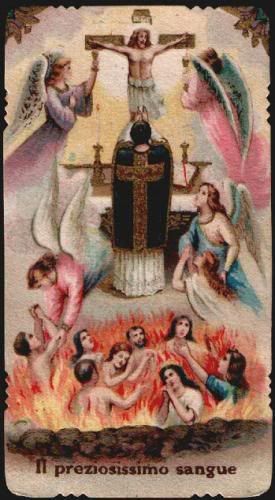
Another Litany for the Suffering Souls
(For Private Use Only)
Lord, have mercy on us.
Christ, have mercy on us.
Lord, have mercy on us. Christ, hear us.
Christ, graciously hear us.
God the Father of Heaven ,
Have mercy on the Souls of the Faithful departed.
God the Son, Redeemer of the world,
Have mercy on the Souls of the faithful departed.
God the Holy Spirit,
Have mercy on the Souls of the faithful departed.
Holy Trinity, One God,
Have mercy on the Souls of the faithful departed.
Holy Mary ,
Pray for the Souls of the faithful departed.
Holy Mother of God,
Pray for the Souls of the faithful departed.
Saint Michael, etc.
Saint Gabriel,
All ye holy Angels and Archangels,
Saint John the Baptist,
Saint Joseph,
All ye holy Patriarchs and Prophets,
Saint Peter,
Saint Paul,
Saint John,
All ye holy Apostles and Evangelists,
Saint Stephen,
Saint Lawrence,
All ye holy Martyrs,
Saint Gregory,
Saint Ambrose,
All ye holy bishops and confessors,
Saint Mary Magdalen,
Saint Catherine,
All ye holy Virgins and widows,
All ye Saints of God,
Make intercession for the Souls of the faithful departed.
Be merciful,
Spare them, O Lord.
Be merciful,
Hear them, O Lord.
From all evil,
O Lord, deliver them.
From Thy wrath,
O Lord, deliver them.
From the flame of fire, etc.
From the region of the shadow of death,
Through Thine Immaculate Conception,
Through Thy Nativity,
Through Thy Most Holy Name,
Through the multitude of Thy tender mercies, Through Thy most bitter Passion,
Through Thy most Sacred Wounds,
Through Thy most Precious Blood,
Through Thine ignominious death, by which
Thou hast destroyed our death,
We sinners,
We beseech Thee, hear us.
O Thou Who didst absolve the sinner woman and hear the prayer of the good thief,
We beseech Thee, hear us.
That thou wouldst release our deceased parents, relations and benefactors
from the bonds of their sins and the punishment for them, etc.
That Thou wouldst hasten the day of visiting Thy faithful detained in the receptacles
of sorrow, and wouldst transport them to the city of eternal peace,
That Thou wouldst shorten the time of expiation for their sins and graciously
admit them into the holy sanctuary, into which no unclean thing can enter,
That through the prayers and alms of Thy Church, and especially by the inestimable
Sacrifice of Thy Holy Altar, Thou wouldst receive them into the tabernacle of rest
and crown their longing hopes with everlasting fruition,
Son of God,
Lamb of God, Who takest away the sins of the world,
Grant them eternal rest.
Lamb of God, Who takest away the sins of the world,
Grant them eternal rest.
Lamb of God, Who takest away the sins of the world,
Grant them eternal rest.
Christ, hear us.
Christ, graciously hear us.
Lord, have mercy on us. Christ, have mercy on us.
Lord, have mercy on us.
Our Father, Who art in Heaven, etc.
V. And lead us not into temptation,
R. But deliver us from all evil. Amen.
V. From the gates of Hell,
R. Deliver their Souls, O Lord.
V. May they rest in peace.
R. Amen.
V. O Lord, hear my prayer ,
R. And let my cry come unto Thee.
Let Us Pray.
O God, Creator and Redeemer of all the faithful, grant to the Souls of Thy
departed servants the remission of all their sins, that through our pious
supplications they may obtain the pardon which they have always desired.
Through Jesus Christ Our Lord. R. Amen.
O God, the Giver of pardon and the Lover of the salvation of men, we beg Thy clemency on behalf of our brethren, kinsfolk and benefactors who have departed this life, that by the intercession of the Blessed Virgin Mary and of all the Saints, Thou wouldst receive them into the joys of Thine everlasting kingdom. Through Christ Our Lord. R. Amen.
O God, to Whom it belongs always to have mercy and to spare, be favorably propitious to the Souls of Thy servants and grant them the remission of all their sins, that being delivered from the bonds of this mortal life, they may be admitted to life everlasting. Through Jesus Christ Our Lord.
Amen.
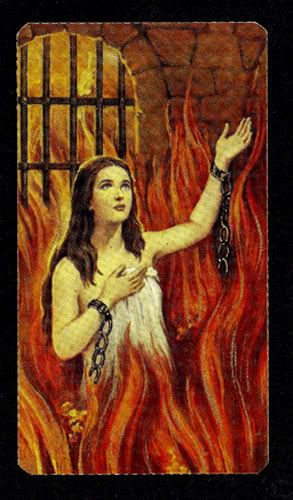
Labels: Hallowmas, Requiescant In Pace
Tuesday, November 01, 2011
All Hallows 2011
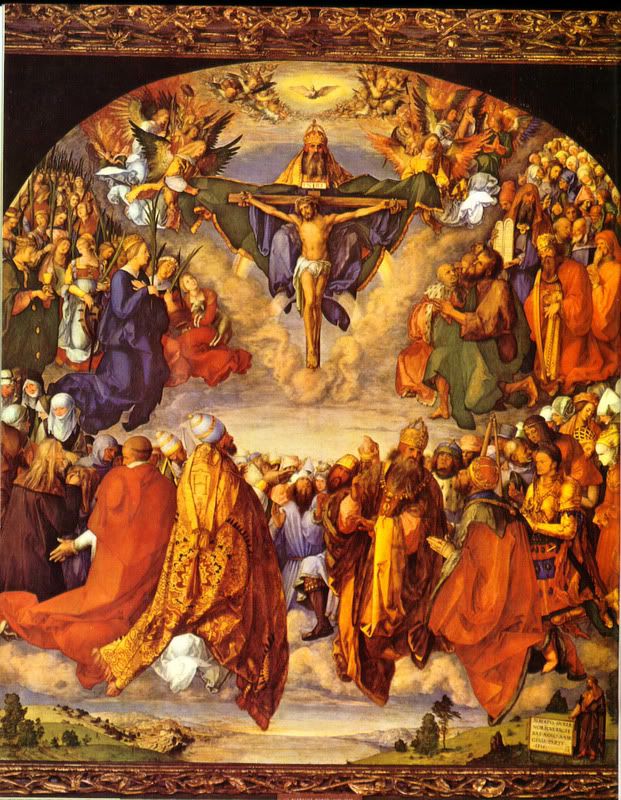
For All the Saints
For all the saints, who from their labors rest,
Who Thee by faith before the world confessed,
Thy Name, O Jesus, be forever blessed.
Alleluia, Alleluia!
Thou wast their Rock, their Fortress and their Might;
Thou, Lord, their Captain in the well fought fight;
Thou, in the darkness drear, their one true Light.
Alleluia, Alleluia!
For the Apostles’ glorious company,
Who bearing forth the Cross o’er land and sea,
Shook all the mighty world, we sing to Thee:
Alleluia, Alleluia!
For the Evangelists, by whose blest word,
Like fourfold streams, the garden of the Lord,
Is fair and fruitful, be Thy Name adored.
Alleluia, Alleluia!
For Martyrs, who with rapture kindled eye,
Saw the bright crown descending from the sky,
And seeing, grasped it, Thee we glorify.
Alleluia, Alleluia!
O blest communion, fellowship divine!
We feebly struggle, they in glory shine;
All are one in Thee, for all are Thine.
Alleluia, Alleluia!
O may Thy soldiers, faithful, true and bold,
Fight as the saints who nobly fought of old,
And win with them the victor’s crown of gold.
Alleluia, Alleluia!
And when the strife is fierce, the warfare long,
Steals on the ear the distant triumph song,
And hearts are brave, again, and arms are strong.
Alleluia, Alleluia!
The golden evening brightens in the west;
Soon, soon to faithful warriors comes their rest;
Sweet is the calm of paradise the blessed.
Alleluia, Alleluia!
But lo! there breaks a yet more glorious day;
The saints triumphant rise in bright array;
The King of glory passes on His way.
Alleluia, Alleluia!
From earth’s wide bounds, from ocean’s farthest coast,
Through gates of pearl streams in the countless host,
And singing to Father, Son and Holy Ghost:
Alleluia, Alleluia!
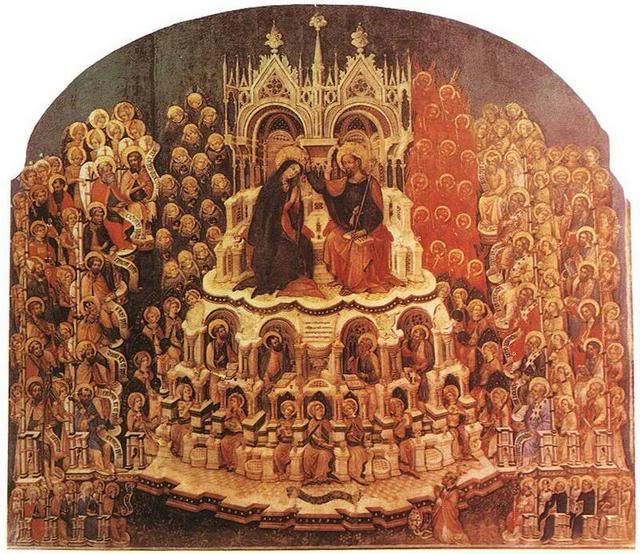
The Litany of the Saints
Lord, have mercy on us. (Lord have mercy on us.)
Christ, have mercy on us. (Christ have mercy on us.)
Lord, have mercy on us. (Lord, have mercy on us.)
Christ, hear us. (Christ, hear us.)
Christ, graciously hear us. (Christ, graciously hear us.)
God the Father of heaven, (have mercy on us.)
God the Son, Redeemer of the world, (have mercy on us.)
God the Holy Ghost, (have mercy on us.)
Holy Trinity, one God, (have mercy on us.)
Holy Mary, (Pray for us.)
Holy Mother of God,
Holy Virgin of virgins,
St. Michael,
St. Gabriel,
St. Raphael,
All ye holy Angels and Archangels,
All ye holy orders of blessed Spirits,
St. John the Baptist,
St. Joseph,
All ye holy Patriarchs and Prophets,
St. Peter,
St. Paul,
St. Andrew,
St. James,
St. John,
St. Thomas,
St. James,
St. Philip,
St. Bartholomew,
St. Matthew,
St. Simon,
St. Thaddeus,
St. Matthias,
St. Barnabas,
St. Luke,
St. Mark,
All ye holy Apostles and Evangelists,
All ye holy Disciples of the Lord,
All ye holy Innocents,
St. Stephen,
St. Lawrence,
St. Vincent,
SS. Fabian and Sebastian,
SS. John and Paul,
SS. Cosmas and Damian,
SS. Gervase and Protase,
All ye holy Martyrs,
St. Sylvester,
St. Gregory,
St. Ambrose,
St. Augustine,
St. Jerome,
St. Martin,
St. Nicholas,
All ye holy Bishops and Confessors,
All ye holy Doctors,
St. Anthony,
St. Benedict,
St. Bernard,
St. Dominic,
St. Francis,
All ye holy Priests and Levites,
All ye holy Monks and Hermits,
St. Mary Magdalen,
St. Agatha,
St. Lucy,
St. Agnes,
St. Cecilia,
St. Catherine,
St. Anastasia,
All ye holy Virgins and Widows,
All ye holy Saints of God, (Make intercession for us.)
Be merciful, (Spare us, O Lord.)
Be merciful, (Graciously hear us, O Lord.)
From all evil, O Lord (Deliver us.)
From all sin,
From Thy wrath,
From sudden and unlooked for death,
From the snares of the devil,
From anger, and hatred, and every evil will,
From the spirit of fornication,
From lightning and tempest,
From the scourge of earthquakes,
From plague, famine and war,
From everlasting death,
Through the mystery of Thy holy Incarnation,
Through Thy Coming,
Through Thy Birth,
Through Thy Baptism and holy Fasting,
Through Thy Cross and Passion,
Through Thy Death and Burial,
Through Thy holy Resurrection,
Through Thine admirable Ascension,
Through the coming of the Holy Ghost, the Paraclete.
In the day of judgment.
We sinners, (We beseech Thee, hear us.)
That Thou wouldst spare us,
That Thou wouldst pardon us,
That Thou wouldst bring us to true penance,
That Thou wouldst vouchsafe to govern and preserve Thy holy Church,
That Thou wouldst vouchsafe to preserve our Apostolic Prelate, and all orders of the Church in holy religion,
That Thou wouldst vouchsafe to humble the enemies of holy Church,
That Thou wouldst vouchsafe to give peace and true concord to Christian kings and princes,
That Thou wouldst vouchsafe to grant peace and unity to the whole Christian world,
That Thou wouldst call back to the unity of the Church all who have strayed from her fold, and to guide all unbelievers into the light of the Gospel
That Thou wouldst vouchsafe to confirm and preserve us in Thy holy service,
That Thou wouldst lift up our minds to heavenly desires,
That Thou wouldst render eternal blessings to all our benefactors,
That Thou wouldst deliver our souls, and the souls of our brethren, relations, and benefactors, from eternal damnation,
That Thou wouldst vouchsafe to give and preserve the fruits of the earth,
That Thou wouldst vouchsafe to grant eternal rest to all the faithful departed,
That Thou wouldst vouchsafe graciously to hear us,
Son of God,
Lamb of God, who take away the sins of the world, (spare us, O Lord.)
Lamb of God, who take away the sins of the world, (graciously hear us, O Lord.)
Lamb of God, who take away the sins of the world, (have mercy on us.)
Christ, (hear us.)
Christ, (graciously hear us.)
Lord, have mercy, (Lord, have mercy.)
Christ, have mercy, (Christ, have mercy.)
Lord, have mercy, (Lord, have mercy.)
[Our Father inaudibly] And lead us not into temptation (but deliver us from evil.)
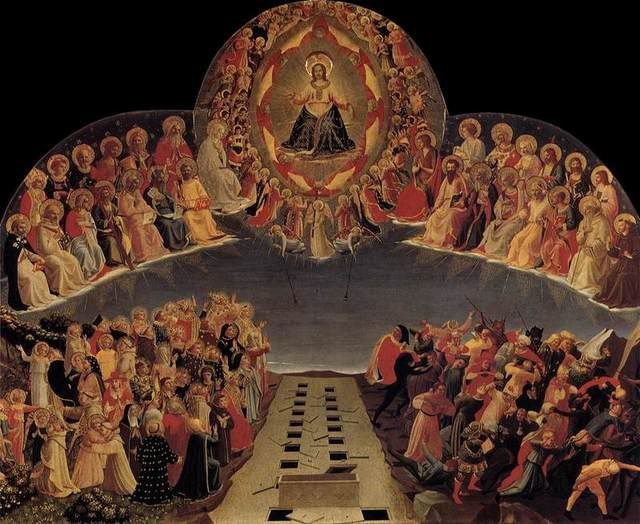
Penitens has a wonderful listing of the saints from the litany, with illustrations.
Also, see Jay at Pro Ecclesia for an excellent summation, bringing together and uniting the history of Halloween and Hallowmas.
Terry at Abbey Roads 2 has another excellent post.
Hallowmas in the Philippines, at Ecce Ego, Quia Vocasti Me.
Labels: Hallowmas
Monday, October 31, 2011
The Propriety Of Catholics' Celebrating Halloween
From Traditio.com (they agree with me on this):
HALLOWEEN
The question often arises about the celebration of Halloween by
Catholics. Is it, for instance, "pagan" to dress up and go about as ghosts
and goblins? The question often comes up because many modern Christians
(mostly non-Catholic ones) believe that Halloween has something to do with
worshipping the devil and participating in witchcraft. The truth is that the
origins of Halloween are rooted deeply in the theology and popular customs of
Catholics.
It is a revision of actual history to say that our modern celebration
of Halloween has origins in Druid customs. It is true that the ancient Celts
celebrated a major feast (the Celtic New Year) on October 31st, but the fact
is that they celebrated a festival on the last day of almost every month.
Halloween, a contraction of "All Hollows Eve," falls on October 31st
because the Feast of All Saints or "All Hallows" falls on November 1st. The
feast in honor of all the Saints used to be celebrated on May 13th, but Pope
Gregory III, in 731, moved it to November 1st, the dedication day of All
Saints Chapel in St. Peter's in Rome. This feast spread throughout the
world. In 998, St. Odilo, the abbot of the powerful monastery of Cluny in
France, added a celebration on November 2nd. This was a day of prayer for the
souls of all the faithful departed. Therefore, the Church had a feast of the
Saints and those in Purgatory.
It was the Irish Catholics who came up with the idea to remember
somehow those souls who did not live by the Faith in this life. It became
customary for these Irish to bang on pots and pans on All Hallow's Eve to let
the damned know that they were not forgotten. In Ireland, then, ALL the dead
came to be remembered. This, however, is still not exactly like our
celebration of Halloween. On Halloween we also dress up in costumes.
This practice arose in France during the 14th and 15th centuries.
During the horrible bubonic plague, the Black Death, Europe lost half of her
population. Artists depicted this on walls to remind us of our own
mortality. These pictures and representations are known as the "Dance of
Death" or "Dance Macabre." These figures were commonly painted on cemetery
walls and showed the devil leading a daisy chain of people into the tomb.
Sometimes the dance was re-enacted on All Soul's Day as a living tableau,
with people dressed up as the dead. But the French dressed up on All Souls,
not Halloween, and the Irish, who celebrated Halloween, did not dress up.
The two were brought together in the colonies of North America during
the 18th century, when Irish and French Catholics began to intermarry. Thus
the two celebrations became mingled, and we began dressing up on Halloween.
It is, as we can see, a very "American" holiday, but Catholic as well.
"Trick-or-Treating" is a very odd addition to Halloween. It is the
most American aspect of the holiday, and is the (unwilling) contribution of
English Catholics.
Guy Fawkes Day became a great celebration against Catholics in
England. It celebrated the day the plot to blow up Parliament and King James
I was discovered. This was on November 5, 1605. Guy Fawkes was the rather
reckless man guarding the gunpowder. He was arrested and hanged. During
these times of persecution of the Catholic Church, bands of revelers would
wear masks and visit Catholics in the night demanding they be given cakes and
beer.
Guy Fawkes Day arrived in the American colonies with the first
English settlers. Old King James had long been forgotten, but "Trick-or-
Treating" was too much fun to give up. Eventually, it moved to the
Irish/French Catholic masquerade. This practice of "Trick-or-Treating" was
simply moved to coincide with the Catholic celebration involving dressing up.
The ancient Druids did contribute the candy, which was used to welcome the
good spirits, and masks (jack o'lanterns), which were used to scare away the
evil spirits.
Halloween can still serve the purpose of reminding us about Hell and
how to avoid it. Halloween is also a day to prepare us to remember those who
have gone before us in Faith, those already in Heaven and those still
suffering in Purgatory. Halloween is a time to let people know about our
Catholic roots and significance. (Fr. Scott Archer)
Catholic parents who are not comfortable with the worst secular
aspects of Halloween, which are admittedly increasing, can avail themselves
of alternative activities on that day: family prayer and fasting for the
Vigil of All Saints Day, visitations of houses in the garments of non-
devilish personae, the reading aloud of stories of the Saints or of seasonal
literature such as Edgar Allen Poe's "The Masque of the Red Death" and
Washington Irving's "The Legend of Sleepy Hollow", and the playing of
seasonal music such as Saint-Saens "Danse Macabre," Modest Moussorgsky's
"Night on Bald Mountain," and Sergei Rachmaninoff's "Isle of the Dead".
A word of caution, however. The Church has always condemned as sins
against the First Commandment, and thus cautioned her children to stay far
away from, astrology, charms, divination, fortune-telling, magic, ouija
boards, sorcery, spells, witchcraft, and other occult activities, even if
they are treated in a trivial or jesting fashion.
St. Thomas Aquinas says that it is not permitted to Christians even
to dabble in such things: "Man has not been entrusted with power over the
demons to employ them to whatsoever purpose he will. On the contrary, it is
appointed that he should wage war against the demons. Hence, in no way is it
lawful for man to make use of the demons' help by compacts -- either tacit or
express" (II-II, Q96, Art. 3).
We remember too the the Prayer to St. Michael against "Satanam
aliosque spiritus malignos qui ad perditionem animarum pervagantur in mundo"
[Satan and the other evil spirits who roam in the world for the ruin of
souls]. As in all things, parents must be sure to teach their children the
proper balance in such matters, erring neither on the side of defect or
excess.
Fisheaters has also examined the historical evidence and comes to the same conclusion.
HALLOWEEN
The question often arises about the celebration of Halloween by
Catholics. Is it, for instance, "pagan" to dress up and go about as ghosts
and goblins? The question often comes up because many modern Christians
(mostly non-Catholic ones) believe that Halloween has something to do with
worshipping the devil and participating in witchcraft. The truth is that the
origins of Halloween are rooted deeply in the theology and popular customs of
Catholics.
It is a revision of actual history to say that our modern celebration
of Halloween has origins in Druid customs. It is true that the ancient Celts
celebrated a major feast (the Celtic New Year) on October 31st, but the fact
is that they celebrated a festival on the last day of almost every month.
Halloween, a contraction of "All Hollows Eve," falls on October 31st
because the Feast of All Saints or "All Hallows" falls on November 1st. The
feast in honor of all the Saints used to be celebrated on May 13th, but Pope
Gregory III, in 731, moved it to November 1st, the dedication day of All
Saints Chapel in St. Peter's in Rome. This feast spread throughout the
world. In 998, St. Odilo, the abbot of the powerful monastery of Cluny in
France, added a celebration on November 2nd. This was a day of prayer for the
souls of all the faithful departed. Therefore, the Church had a feast of the
Saints and those in Purgatory.
It was the Irish Catholics who came up with the idea to remember
somehow those souls who did not live by the Faith in this life. It became
customary for these Irish to bang on pots and pans on All Hallow's Eve to let
the damned know that they were not forgotten. In Ireland, then, ALL the dead
came to be remembered. This, however, is still not exactly like our
celebration of Halloween. On Halloween we also dress up in costumes.
This practice arose in France during the 14th and 15th centuries.
During the horrible bubonic plague, the Black Death, Europe lost half of her
population. Artists depicted this on walls to remind us of our own
mortality. These pictures and representations are known as the "Dance of
Death" or "Dance Macabre." These figures were commonly painted on cemetery
walls and showed the devil leading a daisy chain of people into the tomb.
Sometimes the dance was re-enacted on All Soul's Day as a living tableau,
with people dressed up as the dead. But the French dressed up on All Souls,
not Halloween, and the Irish, who celebrated Halloween, did not dress up.
The two were brought together in the colonies of North America during
the 18th century, when Irish and French Catholics began to intermarry. Thus
the two celebrations became mingled, and we began dressing up on Halloween.
It is, as we can see, a very "American" holiday, but Catholic as well.
"Trick-or-Treating" is a very odd addition to Halloween. It is the
most American aspect of the holiday, and is the (unwilling) contribution of
English Catholics.
Guy Fawkes Day became a great celebration against Catholics in
England. It celebrated the day the plot to blow up Parliament and King James
I was discovered. This was on November 5, 1605. Guy Fawkes was the rather
reckless man guarding the gunpowder. He was arrested and hanged. During
these times of persecution of the Catholic Church, bands of revelers would
wear masks and visit Catholics in the night demanding they be given cakes and
beer.
Guy Fawkes Day arrived in the American colonies with the first
English settlers. Old King James had long been forgotten, but "Trick-or-
Treating" was too much fun to give up. Eventually, it moved to the
Irish/French Catholic masquerade. This practice of "Trick-or-Treating" was
simply moved to coincide with the Catholic celebration involving dressing up.
The ancient Druids did contribute the candy, which was used to welcome the
good spirits, and masks (jack o'lanterns), which were used to scare away the
evil spirits.
Halloween can still serve the purpose of reminding us about Hell and
how to avoid it. Halloween is also a day to prepare us to remember those who
have gone before us in Faith, those already in Heaven and those still
suffering in Purgatory. Halloween is a time to let people know about our
Catholic roots and significance. (Fr. Scott Archer)
Catholic parents who are not comfortable with the worst secular
aspects of Halloween, which are admittedly increasing, can avail themselves
of alternative activities on that day: family prayer and fasting for the
Vigil of All Saints Day, visitations of houses in the garments of non-
devilish personae, the reading aloud of stories of the Saints or of seasonal
literature such as Edgar Allen Poe's "The Masque of the Red Death" and
Washington Irving's "The Legend of Sleepy Hollow", and the playing of
seasonal music such as Saint-Saens "Danse Macabre," Modest Moussorgsky's
"Night on Bald Mountain," and Sergei Rachmaninoff's "Isle of the Dead".
A word of caution, however. The Church has always condemned as sins
against the First Commandment, and thus cautioned her children to stay far
away from, astrology, charms, divination, fortune-telling, magic, ouija
boards, sorcery, spells, witchcraft, and other occult activities, even if
they are treated in a trivial or jesting fashion.
St. Thomas Aquinas says that it is not permitted to Christians even
to dabble in such things: "Man has not been entrusted with power over the
demons to employ them to whatsoever purpose he will. On the contrary, it is
appointed that he should wage war against the demons. Hence, in no way is it
lawful for man to make use of the demons' help by compacts -- either tacit or
express" (II-II, Q96, Art. 3).
We remember too the the Prayer to St. Michael against "Satanam
aliosque spiritus malignos qui ad perditionem animarum pervagantur in mundo"
[Satan and the other evil spirits who roam in the world for the ruin of
souls]. As in all things, parents must be sure to teach their children the
proper balance in such matters, erring neither on the side of defect or
excess.
Fisheaters has also examined the historical evidence and comes to the same conclusion.
Labels: Hallowmas
The Origin Of Trick-Or-Treating
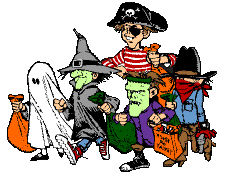
Another cherished Halloween custom is trick-or-treating. This is another one with some Christian origins.
In Celtic times, the inhabitants of the British Isles believed that on the night of October 31, which was their new year's eve, the spirits of those who had died during that year could come back to visit their families. Offerings of food were left by the living for these relatives.
Some donned the clothes of the dead, and begged for the treats from door to door in the village. Sometimes banquets were laid out, after which the people in the guise of the dead were escorted to the edge of town (we still send what we don't want to the edge of town-to the dump).
The Church looked somewhat askance at this custom. But, as the Church did with many pre-Christian customs that we still observe as Christmas rituals, it gave the celebration of the night of October 31st a Christian content.
First All Saints' Day was imposed on November 1st, and made a day of mandatory attendance at Mass. Later, a day to honor all the faithful departed, All Souls' Day was added on November 2nd.
The custom of dressing up in the clothes of the dead and going door-to-door was transformed into the "luck visit" ritual called "going a-souling." Young people would visit, and beg for soul cakes (square cakes of something like raisin bread), sometimes singing souling songs.
If given a soul cake, the visitor would promise to pray for the soul of the donor, or anyone he designated. This custom was, in the 19th century revived and transformed into trick-or-treating.
You will notice a strong resemblence between trick-or-treating and Christmas "luck visits" like carolling, John Canoe, wassailing, the Plough Monday ritual, and the wren boys in Ireland. In England, once Hallowmas was more-or-less replaced with Guy Fawkes Night, and souling fell out of fashion, children used to go door to door to beg "A penny for the Guy?". There was also here in the US, especially in New York, in the 19th century a Thanksgiving Day begging door-to-door ritual which is similar.
They are indeed related customs. Luck or good fortune, in this case in the form of prayers for the soul, are exchanged for gifts of food or drink. Both are new year rituals, with trick-or-treating a reminder that October 31st was new year's eve for the Celts.
Today many Catholic schools have children dress up as saints, and attend Mass on All Saints Day so attired. This is another adaptation of the "luck visit" ritual that is at the root of trick-or-treating. And many children now have two costumes, something spooky for All Hallows' Eve, and a saint's attire for All Hallows.
Why not?

Labels: Hallowmas
The Story Of the Jack-O-Lantern

Many of you will be familiar with this story, but it illustrates the Christian origins of one of the most cherished Halloween customs.
Back in the days after Saint Patrick had converted Ireland, there lived an Irishman named Jack. Now Jack was a notoriously mean, stingy, and hard-drinking reprobate. Jack wanted a drink, but could not afford one. He somehow summoned the Devil, and offered him his soul for a drink. The Devil agreed.
Jack asked for hard cider, and asked the Devil to climb a tree to get apples to make cider from. The Devil climbed up, and sent down some apples. Once Jack had the apples. he quickly carved a cross in the trunk of the tree, making it impossible for the Devil to come down out of the tree. Jack and the Devil agreed that Jack would efface the cross, so that the Devil could come down, and the Devil would never accept Jack's soul into Hell. Jack went off with the cider and laughing in his sleeve.
Jack continued his life of sin. When he finally died, he presented himself at the Gates of Heaven, only to be turned away for being in life too mean, too tight, and too thirsty.
"Well," Jack said, "off to Hell I go." But when he got there, the Devil reminded Jack of their bargain, and refused him. To speed him on his way, the Devil hurled a coal from the fires of Hell at Jack.
Jack had been eating a turnip, and had hollowed it out fairly well. Jack defended himself from the burning coal by putting up the turnip, and caught the coal in it. Since then, using his hollowed out turnip with its coal from the fires of Hell as a lantern, Jack has been wandering the earth in search of a drink and a refuge.
He is known as Jack of the Lantern, or jack-o-lantern.
In Ireland, it was the custom to carve grotesque faces into turnips, and use them as lanterns for going a'souling around Hallowmas.
When the Irish came to America, they found turnips not particularly popular. But the Yankees used pumpkins for everything, including soup tureens, ladles, and storage pots. The Irish found that pumpkins made excellent substitutes for Jack's turnip lantern. That is why we carve pumpkins into jack-o-lanterns to this day.
Labels: Hallowmas
The Ghost's Lament
For many years, this little ditty, that I picked up from some Scholastic Books Halloween-themed book of ghost stories back in the 1970s, has been my way of starting off the festivities. The lines were said to be of old English origin.
The Ghost's Lament
Woe's me, woe's me
The acorn's not yet fallen from the tree,
That's to grow the wood,
That's to make the cradle,
That's to rock the baby,
That's to grow a man,
That's to release me!
The Ghost's Lament
Woe's me, woe's me
The acorn's not yet fallen from the tree,
That's to grow the wood,
That's to make the cradle,
That's to rock the baby,
That's to grow a man,
That's to release me!
Labels: Hallowmas
Sunday, October 30, 2011
Foods For An Authentic Irish Halloween
The Irish, of course, quite apart from saving Western Civilization by safeguarding its learning and the classical tradition during the early Middle Ages, gave us what we now call Halloween.
In Celtic lands, the foremost of which is Ireland, the night of October 31st was the new year, celebrated with fire rites, and feasts laid out for those who had died during the year. The fire rites, sometimes innocent bonfires, at other times sacrificial in nature, were to warm the sun for its coming battle with winter's cold. Villages would spread out foods, especially cider and bread, on tables, and villagers, dressed in the clothes of those who had recently died, would be the guests. They might go door-to-door begging in this sympathetic disguise. We see here the earliest form of trick-or-treating. When the "spirits" had eaten their fill, they were escorted to the edge of town, and the village would be symbolically rid of the spirits of the dead.
In Christian times, the story of Jack Of the Lantern and his hollowed-out turnip lantern and dealings with the devil was added. And the custom of the poor going from door-to-door took on a new twist. The beggars would offer their prayers for the deceased of the household in exchange for soul bread, or soul cakes.
The Church super-imposed the feast of All Hallows or All Saints Day on the day after Halloween, but many of the Celtic customs (vegetable lanterns, house-to-house visiting, bonfires, bobbing for apples--which the Celts picked up from the Romans) continued. And the time of year was even more closely associated with the dead when All Souls' Day was added on November 2nd, and the entire month of November dedicated to the Poor Souls in Purgatory.
Halloween took on its modern form here in the United States after Irish immigrants came in large numbers.
So it is entirely fitting and proper to celebrate Halloween as a great Irish feast, with distinctively Irish foods.
Let's start with Barmbrack, the fruitcake traditionally served for Halloween night. You need a pudding (English and Irish slang for dessert) for Halloween, and barmbrack is the traditional choice. Since the night of October 31st is a traditional time for fortune-telling nonsense, a ring is included in the barmbrack. Whoever finds it will allegedly be married in the next year. This is similar to the hiding of charms that allegedly foretell the future in English Twelfth Cakes.
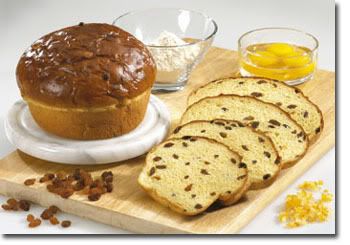
Barmbrack
2 1/2 cup Mixed dry fruit--currants, dates & raisins
1 cup Boiling black tea
1 Egg, slighty beaten
1 Mixed spice
4 tsp Orange Marmalade
1 1/3 cup superfine/castor sugar
2 1/2 cups Self-raising flour
1 ring wrapped in wax paper (optional)
Place dried fruit in a bowl, cover with the hot tea and let soak overnight.
The next day, add the remaining ingredients. and mix well. Add ring wrapped in greaseproof paper(optional).
Preheat oven to 375 F. Pour batter into greased 7" square pan and bake in the center of oven for 1 1/2 hrs.
Let cool in the pan on a wire rack. Slice and serve buttered with tea.
But for your main meal, you need something filling, and Champ certainly is that.
Champ
Want something to serve Halloween night that is not loaded with sugar? Before the kids gourge on trick-or-treat candy and caramel apples, get something with a little substance into them. If it is cold in your part of the country this Halloween night, they'll need something that will stick to their ribs. Try Champ.

Champ is essentially rich-man's mashed spuds. It is traditionally served in Ireland as an alternative to Colcannon on Halloween night. Colcannon often has cabbage, which I dislike. Champ lacks the offending greenery.
You need:
8 large russets (I like Yukon Gold)
2 cups heavy cream
1/2 pound butter
fresh or dried chives to taste
fried or dried onions to taste
salt to taste
freshly grated pepper to taste
1/4 pound butter
1 pound Irish back bacon
Cut a strip 1/2 inch wide along the circumference of each of the spuds. This gives them better flavor, and allows for easier peeling once they have been boiled. Then boil them in their jackets.
Fry up the Irish back bacon. Irish back bacon is more like cured pork than our smoked breakfast bacon. Once the back bacon is done, dry it off with paper towels, and cut off and remove the fat and dice up the choice pieces.
Peel the spuds, and place them in a large bowl and mash them with the cream, the 1/2 pound of butter (or more, if you like) chives, onions, salt and pepper. Mix them up and bring the spuds to a consistency you like. I prefer firm, smooth, and very creamy.
Add in the back bacon and stir.
To serve, mound up the champ on each plate, and hollow out a crater at the top. Here, put in the additional butter sliced up so so that it melts. As you eat forkfuls of champ, dip them in the crater of butter. Sinfully rich and delicious!
I also like this on Saint Patrick's Day.
Now suppose you want to bring out the deep-fat fryer and fry up those russets, instead. Well, french fries are best dipped in something mayonnaisey, right. Here is an Irish dip:
Mustard Mead Dip
1/2 cup mayonnaise
1/4 cup Lakeshore Wholegrain Mustard with Bunratty Meade
1 teaspoon chopped fresh dill
In a small bowl, combine the mayonnaise, mustard, and dill and stir to smooth. Dip your home-made fries to your heart's content. Very hearty and tasty.
While we are talking about sinfully rich Irish foods:

Dubliner Cheese Tart
Pastry
3/4 cup all-purpose flour, sifted
Pinch of salt
5 tablespoons Kerrygold Irish butter, cut into small pieces
3 tablespoons cold water
Filling
1 tablespoon Kerrygold Irish butter
1 small onion, chopped
1 clove garlic, minced
3 slices Irish back bacon, cut into strips
8 button mushrooms, sliced
10 cherry tomatoes, halved
6 ounces Dubliner cheese, grated
1 cup milk
3 eggs, beaten
1 tablespoon Italian seasoning
1 teaspoon wholegrain mustard
Salt and freshly ground black pepper
Preheat oven to 400° F.
Combine the flour and salt in a bowl, then with a pastry cutter, two forks, or your fingers, work in the butter until the mixture resembles coarse bread crumbs. Add the water and form into a ball.
Roll out the pastry until large enough to line a 9-inch quiche pan. Place a piece of aluminum foil over the pastry to cover the base and sides and fill with ceramic pie weights.
Bake for 10 minutes, then remove foil and bake 5 minutes more.
Remove from oven and cool.
Reduce oven temperature to 375° F.
In a large skillet over medium heat, melt the butter. Cook the onions until soft, but not browned, about 3 minutes, then add the garlic, bacon, and mushrooms and cook for 5 minutes.
Spoon the mixture into the pastry base, add the tomato halves, and sprinkle the cheese over the top.
In a small bowl combine the milk, eggs, herbs, mustard, salt and pepper, and pour over the base. Bake until the filling is set and firm to the touch, about 30 minutes.
They are not particularly Irish, but pumpkin seeds, roasted and slightly salted make a nice snack, and I think you can find some easily after you carve your jack-o-lantern. Try different spices on your pumpkin seeds. A little cayenne never hurt anyone.
But an Irish name for Halloween night is Nut Crack Night, so be sure to have a basket of uncracked filberts or walnuts by your side, too.
Mulled apple cider is a great "atmosphere" drink, especially if you serve it in a pewter tankard like this one. Nothing goes better with old ghost stories read by candlelight than mulled apple cider in such a tankard.
Hint. If you are going to make your own apple cider, don't use the apples that the kids have been bobbing for.
In Celtic lands, the foremost of which is Ireland, the night of October 31st was the new year, celebrated with fire rites, and feasts laid out for those who had died during the year. The fire rites, sometimes innocent bonfires, at other times sacrificial in nature, were to warm the sun for its coming battle with winter's cold. Villages would spread out foods, especially cider and bread, on tables, and villagers, dressed in the clothes of those who had recently died, would be the guests. They might go door-to-door begging in this sympathetic disguise. We see here the earliest form of trick-or-treating. When the "spirits" had eaten their fill, they were escorted to the edge of town, and the village would be symbolically rid of the spirits of the dead.
In Christian times, the story of Jack Of the Lantern and his hollowed-out turnip lantern and dealings with the devil was added. And the custom of the poor going from door-to-door took on a new twist. The beggars would offer their prayers for the deceased of the household in exchange for soul bread, or soul cakes.
The Church super-imposed the feast of All Hallows or All Saints Day on the day after Halloween, but many of the Celtic customs (vegetable lanterns, house-to-house visiting, bonfires, bobbing for apples--which the Celts picked up from the Romans) continued. And the time of year was even more closely associated with the dead when All Souls' Day was added on November 2nd, and the entire month of November dedicated to the Poor Souls in Purgatory.
Halloween took on its modern form here in the United States after Irish immigrants came in large numbers.
So it is entirely fitting and proper to celebrate Halloween as a great Irish feast, with distinctively Irish foods.
Let's start with Barmbrack, the fruitcake traditionally served for Halloween night. You need a pudding (English and Irish slang for dessert) for Halloween, and barmbrack is the traditional choice. Since the night of October 31st is a traditional time for fortune-telling nonsense, a ring is included in the barmbrack. Whoever finds it will allegedly be married in the next year. This is similar to the hiding of charms that allegedly foretell the future in English Twelfth Cakes.

Barmbrack
2 1/2 cup Mixed dry fruit--currants, dates & raisins
1 cup Boiling black tea
1 Egg, slighty beaten
1 Mixed spice
4 tsp Orange Marmalade
1 1/3 cup superfine/castor sugar
2 1/2 cups Self-raising flour
1 ring wrapped in wax paper (optional)
Place dried fruit in a bowl, cover with the hot tea and let soak overnight.
The next day, add the remaining ingredients. and mix well. Add ring wrapped in greaseproof paper(optional).
Preheat oven to 375 F. Pour batter into greased 7" square pan and bake in the center of oven for 1 1/2 hrs.
Let cool in the pan on a wire rack. Slice and serve buttered with tea.
But for your main meal, you need something filling, and Champ certainly is that.
Champ
Want something to serve Halloween night that is not loaded with sugar? Before the kids gourge on trick-or-treat candy and caramel apples, get something with a little substance into them. If it is cold in your part of the country this Halloween night, they'll need something that will stick to their ribs. Try Champ.

Champ is essentially rich-man's mashed spuds. It is traditionally served in Ireland as an alternative to Colcannon on Halloween night. Colcannon often has cabbage, which I dislike. Champ lacks the offending greenery.
You need:
8 large russets (I like Yukon Gold)
2 cups heavy cream
1/2 pound butter
fresh or dried chives to taste
fried or dried onions to taste
salt to taste
freshly grated pepper to taste
1/4 pound butter
1 pound Irish back bacon
Cut a strip 1/2 inch wide along the circumference of each of the spuds. This gives them better flavor, and allows for easier peeling once they have been boiled. Then boil them in their jackets.
Fry up the Irish back bacon. Irish back bacon is more like cured pork than our smoked breakfast bacon. Once the back bacon is done, dry it off with paper towels, and cut off and remove the fat and dice up the choice pieces.
Peel the spuds, and place them in a large bowl and mash them with the cream, the 1/2 pound of butter (or more, if you like) chives, onions, salt and pepper. Mix them up and bring the spuds to a consistency you like. I prefer firm, smooth, and very creamy.
Add in the back bacon and stir.
To serve, mound up the champ on each plate, and hollow out a crater at the top. Here, put in the additional butter sliced up so so that it melts. As you eat forkfuls of champ, dip them in the crater of butter. Sinfully rich and delicious!
I also like this on Saint Patrick's Day.
Now suppose you want to bring out the deep-fat fryer and fry up those russets, instead. Well, french fries are best dipped in something mayonnaisey, right. Here is an Irish dip:
Mustard Mead Dip
1/2 cup mayonnaise
1/4 cup Lakeshore Wholegrain Mustard with Bunratty Meade
1 teaspoon chopped fresh dill
In a small bowl, combine the mayonnaise, mustard, and dill and stir to smooth. Dip your home-made fries to your heart's content. Very hearty and tasty.
While we are talking about sinfully rich Irish foods:

Dubliner Cheese Tart
Pastry
3/4 cup all-purpose flour, sifted
Pinch of salt
5 tablespoons Kerrygold Irish butter, cut into small pieces
3 tablespoons cold water
Filling
1 tablespoon Kerrygold Irish butter
1 small onion, chopped
1 clove garlic, minced
3 slices Irish back bacon, cut into strips
8 button mushrooms, sliced
10 cherry tomatoes, halved
6 ounces Dubliner cheese, grated
1 cup milk
3 eggs, beaten
1 tablespoon Italian seasoning
1 teaspoon wholegrain mustard
Salt and freshly ground black pepper
Preheat oven to 400° F.
Combine the flour and salt in a bowl, then with a pastry cutter, two forks, or your fingers, work in the butter until the mixture resembles coarse bread crumbs. Add the water and form into a ball.
Roll out the pastry until large enough to line a 9-inch quiche pan. Place a piece of aluminum foil over the pastry to cover the base and sides and fill with ceramic pie weights.
Bake for 10 minutes, then remove foil and bake 5 minutes more.
Remove from oven and cool.
Reduce oven temperature to 375° F.
In a large skillet over medium heat, melt the butter. Cook the onions until soft, but not browned, about 3 minutes, then add the garlic, bacon, and mushrooms and cook for 5 minutes.
Spoon the mixture into the pastry base, add the tomato halves, and sprinkle the cheese over the top.
In a small bowl combine the milk, eggs, herbs, mustard, salt and pepper, and pour over the base. Bake until the filling is set and firm to the touch, about 30 minutes.
They are not particularly Irish, but pumpkin seeds, roasted and slightly salted make a nice snack, and I think you can find some easily after you carve your jack-o-lantern. Try different spices on your pumpkin seeds. A little cayenne never hurt anyone.
But an Irish name for Halloween night is Nut Crack Night, so be sure to have a basket of uncracked filberts or walnuts by your side, too.
Mulled apple cider is a great "atmosphere" drink, especially if you serve it in a pewter tankard like this one. Nothing goes better with old ghost stories read by candlelight than mulled apple cider in such a tankard.
Hint. If you are going to make your own apple cider, don't use the apples that the kids have been bobbing for.
Labels: Hallowmas
Christus Rex

Christ the King falls on the last Sunday in October in the traditional ordo.
Christ Himself speaks of His Own kingly authority [see link for Bible Citations]: in His last discourse, speaking of the rewards and punishments that will be the eternal lot of the just and the damned; in His reply to the Roman magistrate, who asked Him publicly whether He were a king or not; after His resurrection, when giving to His Apostles the mission of teaching and Baptizing all nations, He took the opportunity to call Himself king, confirming the title publicly, and solemnly proclaimed that all power was given Him in Heaven and on earth. These words can only be taken to indicate the greatness of his power, the infinite extent of His kingdom. What wonder, then, that He Whom St. John calls the "prince of the kings of the earth" appears in the Apostle's vision of the future as He Who "hath on His garment and on His thigh written 'King of kings and Lord of lords!'." It is Christ Whom the Father "hath appointed heir of all things"; "for He must reign until at the end of the world He hath put all his enemies under the feet of God and the Father."
It was surely right, then, in view of the common teaching of the sacred books, that the Catholic Church, which is the kingdom of Christ on earth, destined to be spread among all men and all nations, should with every token of veneration salute her Author and Founder in her annual liturgy as King and Lord, and as King of Kings. And, in fact, she used these titles, giving expression with wonderful variety of language to one and the same concept, both in ancient psalmody and in the Sacramentaries.
Pope Pius XI, Encyclical Letter, QUAS PRIMAS, #11-12
Labels: Christus Rex







































































































